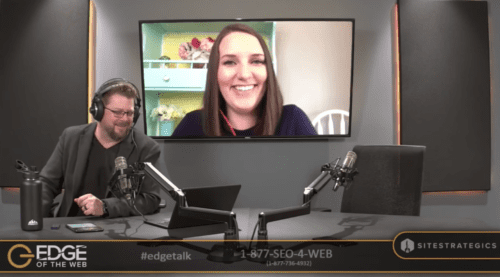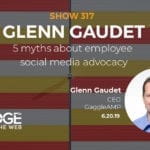Our special guest for Episode 350 of the award-winning EDGE of the Web podcast Amy Bishop, Owner of Cultivative Marketing. Host Erin Sparks spoke with Amy about the ways in which the COVID-19 pandemic is affecting PPC. Here’s what we learned:
Amy Bishop: Her Background and Experience

Amy Bishop is the owner of Cultivative Marketing. She’s actually built and implemented multichannel digital strategies on a variety of companies of all sizes from startups and small businesses to Fortune 500 companies and global organizations spanning a range of different industry verticals. Her expertise includes e-commerce, lead generation, and localized store site strategies.
Amy appears regularly at industry conferences around the United States and internationally. She spoke at HeroConf and the SMX circuit among others. Amy is the local chair for SEMPO-Louisville. Amy also writes for leading industry publications Search Engine Land and Marketing Land. Her primary role at Cultivative is helping clients with paid media, including both paid search and paid social on just about any platform you can think of. She’s constantly in client accounts tweaking and making adjustments to make sure they reach their goals.
Amy has already been in the digital marketing industry for ten years, which feels like much longer given how rapidly the field evolves and changes. She has worked at small agencies, large agencies, and has also been the in-house digital marketing leader at companies. When she realized the only thing she hadn’t done yet was start her own business, she went ahead and did that as well, and started Cultivative Marketing two years ago. Being an owner is very different from working for a company, but it’s been very rewarding for her.
How the Pandemic is Impacting PPC
It’s clear that a lot of businesses have simply had to pull back on ad spending given the extreme uncertainty of everything with the pandemic shutting down so many businesses. As a result, Facebook and Google talking about standing to lose about $44 billion in ad revenue, which is obviously a big deal.
Amy has the impacts right across the board. There are clients who have hit the pause button because they need to conserve cash on hand not knowing where this is all heading. But not all of the impacts are negative. Trade schools with online offerings are doing really well right now because so many people are either already unemployed or aren’t feeling secure about their employment and are looking for inexpensive ways to further their education. Companies that help doctors do telehealth online are doing really well right now as well.
What’s interesting is that for the businesses that have been able to stay in and not pause, Amy is seeing the CPCs (cost-per-click) and CPMs (cost-per-thousand-impressions) come way down, which is just not something you ever see. And it’s because so many have had to pull out, so the demand is way down. And while overall clicks are down, conversion rates are still decent, which means the CPL (cost-per-lead) is also surprisingly low. Much of this hinges on the fact that right now we’re not in a full-blown recession yet. We’re in a reactionary phase where consumers haven’t drastically pulled back yet. And for companies that have an offering that fits what consumer need and want right now in the current pandemic environment, then there is great success to be had. But it would be a mistake to say something like everyone should double-down on marketing, because you have to be careful you’re meeting a need in the current situation and not just exploiting it or taking advantage of it. And you have to be really careful around your messaging so it doesn’t looking like you’re actively exploiting a crisis to make money. Customer-centricity is more important than ever. You don’t want to even appear insensitive.
In fact, the better play might be to up your level of altruism, to provide even more value to customers and clients than they’re paying for. It’s the right thing to do in a time of crisis, and those customers will be grateful and will remember the brand for it, which can only help you in the long run. Altruism is always important, but even more so right now during the pandemic. The mantra of “we’re all in this together” has never been truer.
How the Ad Platforms are Responding
Google is offering small and medium businesses (SMBs) $340 million in ad credits. That’s just good business to help those who are struggling at this time. But it’s also tricky because these programs don’t always roll out quite as intended. How are they defining SMBs? What is the timeframe for receiving the credits? But if you have to have been an active advertiser up to this point, is the money really going to go to the ones who need it? Without the details, it’s hard for a small business to know if they should bite the bullet and keep spending on ads in order to stay active enough to get the credit.
Facebook is also offering help in the form of $100 million in both cash grants and ad credits. It’s not clear what the split is between those two types of support. The cash grants can be used for workforce expenses, rent, and operational costs, as well as connecting with companies (that would be the ad credits). It sounds like Facebook is going to select 30,000 businesses to get help, and they have to apply.. And there are eligibility restrictions, such as having between two and 50 employees, and must be operating near a place where Facebook has operations, which is only about 28 cities around the country. Facebook has no operations in Indiana, so no Indiana business is going to benefit from the Facebook program. And it’s a global program, so those 30,000 businesses are going to be all over the world. The business must have been operating for at least a year, has to be for-profit (are they going to do something different for non-profits?) and of course has to have experienced hardship because of the pandemic. But still, overall, a lot of businesses are going to get some help.
What Companies Should do with PPC Right Now
The key, according to Amy, is that for the businesses who can’t do their normal thing, they need to see if there’s a way to pivot what they offer in order to meet another need of their customers during this time. If they can go virtual with any of their offerings, they should. They need to stay connected to and communicating with their customers in a way that’s mutually beneficial and from that “we’re all in this together” kind of context. They could look at testing out some video content if they haven’t before, and everyone’s going to be more forgiving in this environment if the content is the highest quality possible. Be authentic and concerned and give it a try. Just think through the challenges your customers are dealing with, and if you can address those from a place of being helpful, then that’s a good approach to marketing during this time.
Connect with Amy Bishop and Cultivative Marketing
Twitter: @Hoffman8 (https://twitter.com/Hoffman8)
LinkedIn: https://www.linkedin.com/in/amybishopmarketing
Website: https://cultivativemarketing.com
Put the Spotlight on Your Digital Marketing ROI
If you don’t feel like you can clearly see your digital marketing ROI, we can shed some light on it for you! Sign up for a Site Strategics report examining your SEO, content, social media, and PPC. Visit https://edgeofthewebradio.com/roi to get 30% off a comprehensive review of your digital assets!


